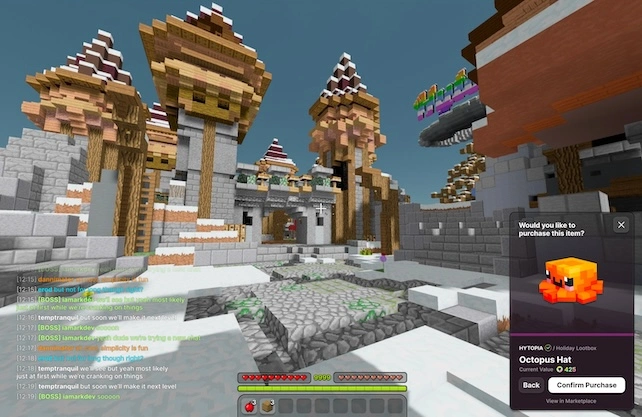It’s a better way to game, just like Netflix is a better way to watch TV.
Crypto gaming, or what some call web3 gaming, uses blockchain technology to let you own and trade in-game assets with digital currencies and NFTs.
What does that mean?
Well, say Roblox ran on crypto.
When your crackhead niece dings you to load up $50 worth of robux and then proceeds to blow it all on rare skins and accessories that same day? Instead of asking for another $50 tomorrow, she could sell that stuff to other Brookhaven addicts in the marketplace.
Hell, if she was smart about it, she might even profit.
Plus, she could take those items to other games outside of Roblox, as long as they’re on the blockchain.
As a player, doesn’t that sound awesome? Or do you prefer limitations and having Sony, Microsoft, and Activision Blizzard bleed you dry?
I mean…
If you wanna buy an adorable octopus hat, bahgawd, you should be able to do whatever you want with it.

Imagine Nike telling you where you can and can’t wear your Jordans. Or that, nope, you can’t sell ’em on Facebook Marketplace for $30 when you’re done with them.
That’s crazy, right?
They’re your shoes. You bought them.
So why should digital assets be any different?
That’s the first advantage of having crypto under the hood in games. But it’s not the only one.
You’ve also got:
- More ways for UGC creators to build what players want and monetize their work.
- All transactions and ownership are verifiable.
- Some crypto games let you have a say in game development and policies through token-based voting.
- When in-game items are limited and unique, it makes ’em more desirable.
- Items bought in-game can retain or even increase their value over time, unlike traditional games where they’re worth nothing once purchased.
- Players’ achievements are recorded.
- Studios and publishers can finally take a small cut when players buy, sell, and trade among themselves.
I know what you’re thinking, though.
“If it’s so great, then why aren’t the big gaming companies adopting this technology?”
Some are, but it’s complex and expensive, so it takes time. It’s no different than a car manufacturer switching from gas to electric vehicles.
Others aren’t trying to fix what ain’t broke – at least, in their mind.
For some, it’s a control thing. Blockchain decentralizes ownership and transactions, which they may not want.
There’s also regulatory hurdles, questions about market readiness, and the list goes on.
But it’s like they say: Adapt, or get left behind, right?
Crypto gaming is the future
Sure, it won’t happen overnight, but you can’t put the toothpaste back in the tube.
Once players and UGC creators have superior experiences with blockchain-built games, they’ll cast their votes with their time, attention, and wallets.
And once game publishers and studios realize they can leverage web3 to earn a share of player-to-player transactions – currently confined to black markets due to banking regulations and money transmitter issues – they’ll get on board, too.
But I get it – terms like “crypto” and “NFT” can be triggering for gamers right now.
We’ve seen bad actors and heard ridiculous stories about people spending millions on monkey JPEGs. It’s the wild west of the industry, and you have every right to be skeptical.
Here’s the thing, though:
When the dust settles, you won’t be able to distinguish a crypto game from a non-crypto game unless you go looking for it.
Think about it:
When you take a picture on your iPhone, you don’t give a shit about the advanced camera sensor technology that makes it possible. You just click the white button and move on.
You barely remember Polaroids and waiting days for Walgreens to develop your pictures – half of which you’d toss in the trash.
Critics of web3 gaming? They’re stuck on buzzwords or judging the whole space by the half-baked, cash-grab crypto games that hit the scene early on.
But the real deal is coming. Fun games. Games people actually want to play.
And some will dive into the marketplaces; some won’t. Simple as that.
So on that note…
Is crypto gaming a good investment?
Absolutely.
I bet every dollar I have on a single project called HYCHAIN. It’s a cutting-edge gaming blockchain that fuels and scales the next generation of video games.
They also create their own blockbuster games, with two new titles about to drop: Loot Legends, a mobile game where you explore and fight your way through dungeons, and HYTOPIA, which is basically Minecraft on molly.
By investing in their token, $TOPIA, you get to benefit from both the advanced blockchain technology and the exciting new games they develop.
Here’s one of the cofounders, ArkDev, on the massive potential of HYTOPIA alone:
🚨 2023 HYTOPIA Update Video 🚨
— ArkDev | HYTOPIA (@iamarkdev) August 24, 2023
We believe @HYTOPIAgg can become one of the largest games/game platforms in the world
The video explains how, why, & more
If you know of @HYTOPIAgg, or just discovered it.. This video is a MUST watch
Give your thoughts in the replies👇$TOPIA pic.twitter.com/SD6ncUCYeP
I’d drag my balls across a football field of broken glass and rusty nails just for the chance to invest in this ecosystem.
Thankfully, all’s I had to do was swap $ETH for $TOPIA.
Here’s more: Why HYCHAIN is the next 100X in crypto.
My best advice? Don’t let tax season hit you like a truck. Even swapping from one crypto to another is taxable, and the IRS is watching. Read my CoinLedger review and get organized before it’s too late.